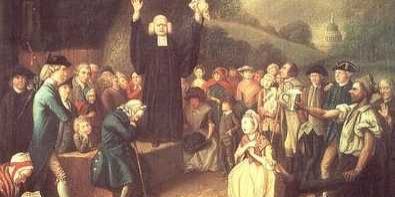
What Shall We Think of Revival?
By Timothy Raymond –
With the recent resurgence in confessional Protestant Christianity among younger people (in which I include myself), there’s been a corresponding rediscovery of the phenomenon of revival. And by revival I’m not talking about that annual week of summer tent meetings led by itinerate evangelist Bro. Daryl. Defined theologically, revival refers to a sovereign work of God’s Spirit in a particular geographical locale whereby in a relatively brief period of time the Church repents en masse, a hunger for preaching and prayer becomes insatiable, a passionate pursuit of personal holiness becomes paramount, corporate and personal evangelism become commonplace, and numerous and remarkable conversions are not infrequent. We have many examples of what I just described in the First and Second Great Awakenings under the ministries of men such as George Whitefield, the Wesley brothers, Jonathan Edwards, and Asahel Nettleton. Such revivals cannot be fabricated through human methods or gimmicks but are granted according to the sheer pleasure of His will.
Consider one historical description of revival:
“In 1858 John Girardeau was leading an evening service at his church in Charleston, North Carolina, when ‘He received a sensation as if a bolt of electricity had struck his head and diffused itself through his whole body. For a little while he stood speechless under the strange physical feeling. Then he said, “The Holy Spirit has come; we will begin preaching tomorrow evening.” He closed the service with a hymn, dismissed the congregation, and came down from the pulpit; but no one left the house. The whole congregation had quietly resumed its seat. Instantly he realized the situation. The Holy Spirit had not only come to him, He had also taken possession of the hearts of the people. Immediately he began exhorting them to accept the Gospel. They began to sob, softly, like the falling of rain; then, with deeper emotion, to weep bitterly, or to rejoice loudly, according to their circumstances. It was midnight before he could dismiss his congregation. A noted evangelist from the North, who was present, said, between his sobs, to an officer of the church: “I never saw it on this fashion.” The meeting went on night and day for eight weeks.’” (Brian H. Edwards, Revival: A People Saturated with God, 11-12)
Now accompanying these revivals, it was not uncommon to observe behavior and practices that can only be described as rather unusual. Some of the first-hand accounts make the kookiness we see on TBN positively drowsy. Prolonged weeping and wailing, sermons lasting upwards of 6 hours, healings and miracles, revelatory dreams, trances, and visions, angels and devils appearing in corporeal form; there’s even one apparently reputable legend of a prominent revivalist’s wife literally levitating. (For numerous historical examples, see chapter 6, “Error, Excess and the Unusual in Revival” in Brian H. Edwards, Revival: A People Saturated with God.) Some of these accounts would fit in well on Ripley’s Believe it or Not.
Now to be completely honest, I’m not quite sure how to make sense of revival. I certainly don’t want to put God in a box and claim He can or cannot do certain things. Yet at the same time, it doesn’t do the Church or the world any favors to attribute to God something He is not doing. Even worse is to attribute to the Holy Spirit the works of Beelzebub.
Now as I see it, there seem to be only three options when trying to make sense of revival. We could dismiss it entirely and claim it’s all nonsense or the work of the devil, which many have done. Or we could indiscriminatingly embrace it all and claim it’s always and everywhere a work of God. Again, many have advocated this course. Or we could say that some of it is of God while some of it is due to human excess and/or Satan. As you may suspect, I’m drawn to this third option, and yet I still have problems. How do you sort out the good from the bad? How do you discern a work of the Spirit from a work of Satan? How do you sift the wheat from the chaff? I find this especially challenging since most revivals seem to be long ago and far away and there appears to be relatively little clear scriptural teaching on revival (at least that I’m aware of).
So let’s have a discussion. If you’ve got thoughts you’d like to contribute to this conversation, leave them in the comments below. I’m mostly interested in exegetical or theological principles that might apply here. If the Bible is our final authority, all experience must be interpreted through scripture and not vice versa. So what shall we think of revival?
Timothy Raymond is an editor for Credo Magazine. He has been the pastor of Trinity Baptist Church in Muncie, Indiana since April 2006. He received his MDiv from the Baptist Bible Seminary of Pennsylvania in 2004 and has pursued further education through the Christian Counseling and Educational Foundation. Tim grew up outside Syracuse, NY and previously served at Berean Baptist Church, Nicholson, PA (member and teacher during college and seminary) and Calvary Baptist Church, Sandusky, Ohio (seminary internship location). Tim met his wife Bethany at college, and they were married in May 2001. Tim enjoys reading, weight-lifting, wrestling with his three sons, and attempting to sleep.

